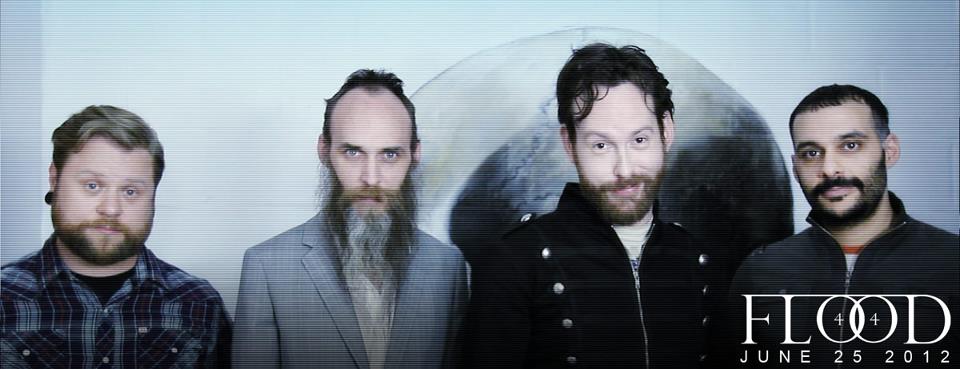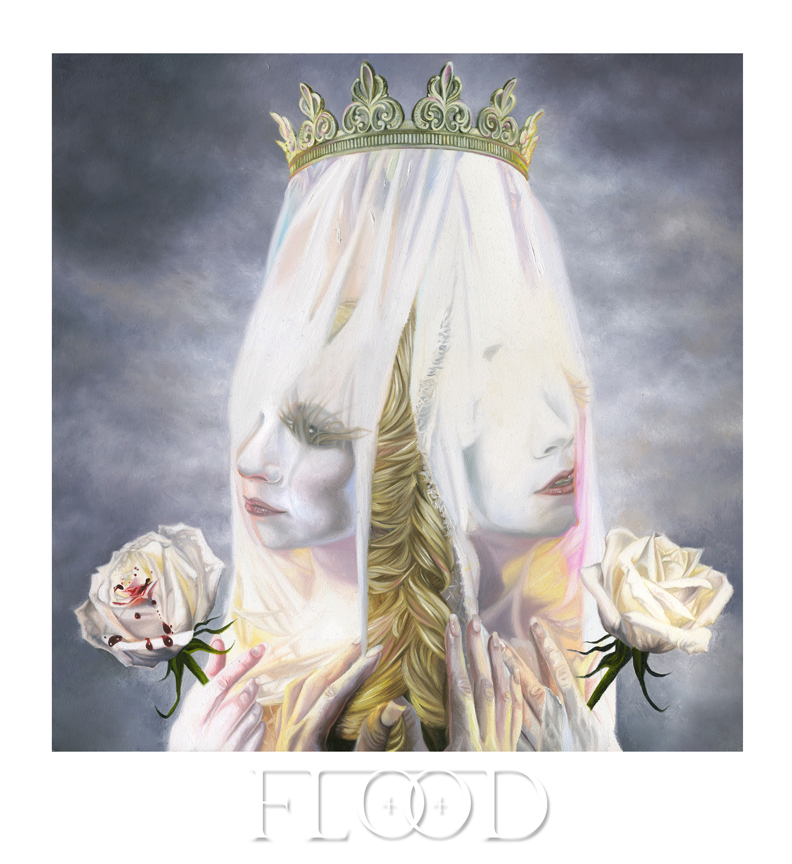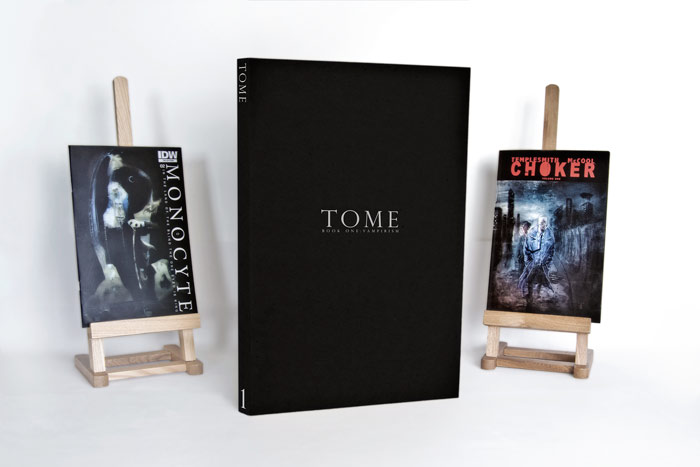We all want to do things our way. The most freeing thing in the world is to be able to express oneself whether that be through writing, music, art. It's what makes us who we are. It's even more freeing to let others enjoy something you have created.
There has always been that hindrance that limited the work of countless artists throughout the years. Certain type of music doesn't "sell" or certain publishers wouldn't be caught dead printing certain comics. That crazy painting you spent months on? No gallery would be caught dead hanging that on their walls.

That's where 44 Flood comes in -- comprised of Menton Matthews aka Menton 3, Kasra Ghanbari, Ben Templesmith and Nick Idell. They were tired of answering to everyone else and set out to create things they love and that they'd want to see themselves.
After launching their proposal via the crowd funding site Kickstarter, they met their goal of $18,000 in less than four hours. People believed in what they set out to do almost immediately and the guys we're floored, overcome with endless gratitude and love from their supporters. This crazy idea they had suddenly wasn't so crazy any more. It was a reality. As each day passes, more and more people are contributing to their project which still has about 40 days left to raise money.
I got a chance to talk to them about it.
Dave: So starting off, What makes the combination of the four of you special? Each of you brings something different to the table. Was that a specific formula you looked at to cover all grounds?
Kasra: You can't always predict these things and a lot of good things happen overtime. We've all gotten to know each other over a real amount of time. You become more and more conscious of what people can do, things with their personality, their professional experience and it just started getting even a little strange to us when we were starting to think about working together. How the four of us kind of filled four different quadrants. Our spheres of influence were complementary to each other and when we saw that, we saw that as a little sign that something special might be here. We use the analogy of a little bit of a band where the bass player is just as important as the guitar player, just as important as the drummer and the singer. If one of those is off, you don't have that special thing. I think we've had enough time to build this that when we work together for us at least, it's pretty special and explosive.
Dave: So you think it wasn't really so much as a conscious effort so much as things kind of just we're there once you got together?
Menton 3: You know how when you are on a date with a girl and you're watching the moon and there's a shooting star or something? A lot of it was just totally synchronicity. It just lined up perfectly, things coalesced in a way that was just perfect for the outcome. I couldn't be happier working with anyone else. We do have two other guys we work closely with Steve Niles and David Stoupakis so in that way it's kind of 66 Flood. We work very well together. It was a very organic thing even though it was something we intended to put together. There is no leader of this business.
Dave: So all boy and jokes aside?
Menton 3: (Laughs) Yeah all boy band and beard jokes aside, it's actually something very special to us. Our friendship is special to all of us. We take brotherhood very seriously. I'm very lucky to work with these men.
Kasra: What more could you ask for to look at the other three guys you are working with and say that if any one of them were gone, you wouldn't have done this?
Dave: I think it's good that you guys aren't limiting yourselves to one medium. It's not just "Hey I'm gonna do comics." You're going out on all fronts, and not limiting yourselves to one particular audience.
Menton 3: I love art. That's poetry, photography you know writing. Paintings. We love art. We're big fans of the expression of oneself. The imagery, the storytelling, these things are the things that for me, make life worth living. We are making something that we would want ourselves.
Dave: That kind of fits into my what I was going to ask with my next question, The fact that you guys are grouping all these things together, with comics, fine art, prose, with this was it part of the attempt at trying to get people to take comics more seriously and as an art form?
Ben Templesmith: Yeah, I mean if you look at any other industry or any other medium it's regarded as a serious art form. When someone thinks of music, they don't think of Mary Poppins or when someone mentions a painting, "oh that's a painting people made those things 500 years ago." The comic book scene is a fleeting, childhood adolescent sort of power fantasy still in Anglo-American culture. I think there's a huge untapped area there, and I'd just like a bigger audience for my work and I think the other guys would agree.
Menton 3: Yeah I mean I know for me, I don't really see the distinction but I know in popular culture comic books are kind of seen in a particular way. I know I say this a lot but what is the Sistine Chapel but a graphic novel all over the walls of an amazing building? Storytelling with narrative imagery is as old as humanity. The fact that comics focus on one particular type of comic is a little absurd to me. I mean I like those comics, I collect them, I read them I enjoy them, but for example the work of Bill Sienkiewicz people know him from his work from New Mutants very few people know about Stray Toasters, I think that's one of the most phenomenal comics ever. I think that it's there, people just don't know how to access it. I think one of the things we are trying to be as an easy vehicle for people to find that type of content.

Dave: Yeah I think one of the hardest things to get someone into reading a comic, is getting them over that stigma of actually reading a comic. Just to get it in front of them to open it up and read is hard.
Menton 3: If you think of a young kid who is hipper and smarter and younger than me and they walk into a comic book shop, there's a wall of comics and of course they are going to go for the ones that are the most represented. What they get confronted with is the biggest comics they don't see any of the little ones, and they walk out of the store thinking that that's what comics are. There is a huge kinda gap between people who collect Juxtaposed magazine and comics all though there is just the same amount of relative and important art going on in comics, they just don't know how to connect it. I'm not saying we are going to connect it, again we're just making something we really want as fans.
Dave: So Nick, as an owner of a comic book shop, this obviously is something that could get people into comics. What do you think you need to get people into comics who normally wouldn't be into them?
Nick: Anything that strays away from the typical book and hopefully gets people into shops. The books that we're gonna create are gonna be a great catalyst to do so. I feel the same way as you, when I recommend a book to someone It's rarely ever a capes book or something that I grew up with that I love, it's more a book that has phenomenal story with great plot and character development that just so happens to be in the medium of comics. We're gonna try to make that quality of fiction.
Kasra: Maybe one thing we are gonna attempt is drawing the distinction perhaps between the comic book medium and the comic book industry. Whereas the industry tends to be a little insular why not just look at the medium in its broad application? We see it in magazines and newspapers like the New York Times. We see subgenres of it in books like Palestine and books by people like Lynda Barry. They're not really looked at it as part of the comic book industry, It's regarded as a higher form of art.
Dave: Yeah it's taken a lot more seriously than traditional mainstream comic books, for sure.
Kasra: Yeah, they are never really identified as just comic books. They are treated like an art form.
Dave: When you originally came up with the idea of Tome, was it always as developed as it is now? To feature such different yet similar forms of art or did things fall into place more and more?
Menton 3: The concept for Tome was pretty much there. it's kind of weird to talk about but it was always just there. The original concept hasn't changed at all. More than anything whatever happens with the book, we can't wait to get our hands on it. We're the biggest fans of it. We're talking about a huge 12x18 book., you're gonna see art in a lot of ways the way it was it was intended to be seen. Tome is a concise shot across the bow of what we really love. Some of the guys we have involved, it's a dream come true for us.

Dave: Anything else you guys wanted to talk about?
Menton 3: I just want to give a heartfelt thank you to anyone who has backed us on this. Honestly and truthfully we are touched beyond absolute articulation. We have no idea, even emotionally how to deal with this. This means the world to us. We live in a time period in which art seems to be less important. When the highest form of art you see when you go out is an advertisement, we're in trouble.
?
Follow Dave Scheidt on Twitter: www.twitter.com/davescheidt
"; var coords = [-5, -72]; // display fb-bubble FloatingPrompt.embed(this, html, undefined, 'top', {fp_intersects:1, timeout_remove:2000,ignore_arrow: true, width:236, add_xy:coords, class_name: 'clear-overlay'}); });
Source: http://www.huffingtonpost.com/dave-scheidt/44-flood_b_1633030.html
restrepo nba news nba news florida gators hope solo hope solo texas high school football
No comments:
Post a Comment
Note: Only a member of this blog may post a comment.